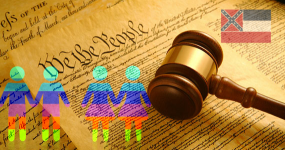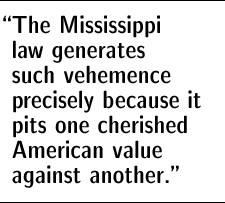Why Mississippi’s Religious Liberties Law Is More Nuanced Than You Think
 Do you think that a wedding florist should be allowed to deny service to a gay couple just because they’re gay?
Do you think that a wedding florist should be allowed to deny service to a gay couple just because they’re gay?
Do you think that a Jewish photographer should be allowed to refuse photography services to a Neo-Nazi group just because of the nature of that group?
Do you think that a store — on religious grounds — should be allowed to refuse insurance coverage for birth control?
Do you think that an advertising agency — on contrary religious grounds — should be allowed to refuse to help that store’s owners explain their position?
 If you have different answers for these four questions, then you appreciate the complexity of Mississippi’s controversial “Protecting Freedom of Conscience from Government Discrimination Act” (HB 1523), which was just signed into law; of Georgia’s similar “Free Exercise Protection Act” (HB 757), which that state’s governor vetoed; and of similar legislation.
If you have different answers for these four questions, then you appreciate the complexity of Mississippi’s controversial “Protecting Freedom of Conscience from Government Discrimination Act” (HB 1523), which was just signed into law; of Georgia’s similar “Free Exercise Protection Act” (HB 757), which that state’s governor vetoed; and of similar legislation.
Mississippi’s law claims to protect people, and groups of people, who act based on a “sincerely held” belief or “moral conviction” in any of three hotly debated tenets:
- Marriage is only between one man and one woman.
- Sex should be confined to such a one-man-one-woman marriage.
- People have only one gender (“sex”), the biological one with which they were born.
Opponents to the law say it legalizes discrimination against, for example, gay couples.
Proponents counter that it protects religious freedoms.
In my opinion, both claims are right (though that doesn’t mean that I think both sides have equal merit). The Mississippi law generates such vehemence precisely because it pits one cherished American value against another.
In this country we believe in equality before the law. We have already established, for instance, that it’s illegal to set out to hire men instead of equally qualified women, no matter how much an employer may prefer working with men.
In this country we also believe in freedom of religion. We have already established, for instance, that the Church can bar women from certain positions of leadership, no matter how qualified they might otherwise be.
Or to look at it differently, the opponents to Mississippi’s law say that, in this case, equality trumps religious freedom. Proponents say that these religious freedoms trump equality.
And here, I think, is the real issue: when these two supreme values collide, which one do we, as a society, choose? And why?
Unfortunately, the public conversation plays out differently.
Proponents double down, defending their religious position, for instance, that marriage is, was, and always shall be between one man and one women. (I think they’re wrong, but that isn’t the point.) They ignore the fact that similar religious arguments were advanced in the 19th century to defend slavery. And they ignore the fact that even Christian-owned stores are not allowed to discriminate against women, even though the Church is.
Opponents also double down, defending their position, for instance, that a marriage between two men is just as valid as a marriage between a man and a women. They ignore the fact that they might experience supreme discomfort if they had to work in support of the KKK. (The KKK probably takes offense at my position, but that isn’t the point.) And they ignore the fact that laws already permit religious gender-based discrimination.
So I have a challenge:
If you defend this law, why do you think that these particular religious beliefs are more important than equality? That is, how is an anti-gay-marriage stance different than, say, 19th-century pro-slavery religious beliefs or, more generally, other gender-based religious beliefs?
If you oppose this law, why do you think that these particular religious beliefs should be squashed? That is, how is forcing people to support gay marriage different than, say, forcing people to work on their sabbath, or forcing people to support other things they don’t like, such as perhaps, the KKK?
And in the meantime, as we continue to discuss this law, perhaps we can at least tread softly out of respect for people who disagree with us.




Take it with a pinch of salt laws are made to be broken and most of us won’t think twice about it if it suits our lifestyle. If drawing the line begins to cost me I may change my glasses but of course I will argue I’m being consistent.
Who’s trading with China ? Who can afford not to trade with them?
You lay out all the arguments that have been running through my mind since this firestorm erupted. I guess my final take is that we should respect other’s beliefs . I may not agree with your ideas but unless it causes harm I should not be able to override them just because I disagree.
As we both know, those that sit opposite each other and and quote bible verses may not be correct in what they are spouting. If we got to know each other we might find we are not as much apart as we first thought.
As usual, Joel has clearly articulated both sides of the issue; and coherently, and logically shown the strengths–and weaknesses of each side’s positions. Each side is “right”…until the conclusion begins to impact beliefs each of us hold dear. Is there a “right’, an ideal…as Plato suggested in his theory of Forms? Or, does what is “right” appear different depending on where you stand–like testimony from witnesses standing on four different corners when an accident occurs? So easy, and yet so very hard. I want to say that HB 1523 and HB 757 are categorically wrong, but I cannot. This is one time when “Either/ Or” doesn’t work–but “Both/ And”, does: these laws are not “Either” good, “Or” bad–they are “Both” good, “And” bad. Where the line is…that remains the question.
My view is that a business that has committed to operating in the public domain (be it a florist, be it a multi-national corporation) has also committed to abide by the laws that forbidding discriminatory practices against any given group. If private institutions (like Churches) wish to opt out of involvement with same-sex marriage then fair enough – to go down the road of being able to refuse service or employment is going beyond religious freedom and into the realm of blurring Church and State. It’s the enforcement of one set of what should be private beliefs upon everyone, irrespective of whether those beliefs are shared, which in my view is wrong.
Thank you for this well thought out and logical discussion. I have recently had your book and blog recommended. I am interested and will be reading lots more I am sure. I am a new blogger. You can find me via google.com search: searching4eternity, in case you want to check me out. Or https://searching4eternity.blogspot.com/. Coincidentally, my most recent post is: “1500 Years of Mistranslation and Misinterpretation”. June
I wouldn’t mind people or businesses discriminating against me for my beliefs, race, or sex. Another business will gladly provide those services. That said, it is only a possibility at this point because of laws like the Civil Rights Act of 196# (I can’t remember the date). I answered yes to all 4 questions too, though the ad agency one I am not sold on.
What if the government got out of marriage all together? What if we were taxed strictly as individuals and people could marry as their customs dictate? Multiple spouses? Check. Dudes marrying dudes? Check. But what about a 30 year old marrying a 12 year old?
I guess my point is that we don’t really mean all people are equal; we mean our viewpoints are equal. And nobody at their core believes that all views are equal or thinks that believing that is wise. At some point we as a society have to agree on our presuppositions in order to know what the collective good is. When we disagree there are times where compromise causes pain and suffering to one person or the other. For example, slavery. The pain and suffering was different depending on who you were. And society as a whole was forced to operate under the presupposition that all MEN are created equally (although it is still struggling to take hold cultrally).
Thought provoking post. Nicely worded. It offends both sides equally! Haha.
Keith